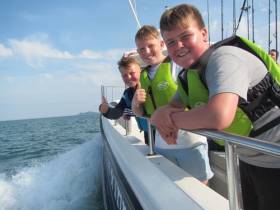Displaying items by tag: Fish & Film
Finalists Announced In Film Competition For Junior Anglers
#Angling - Four fishing clubs have been announced as finalists in Inland Fisheries Ireland’s Fish & Film Competition.
Junior members of Ballyshannon and District Angling Association in Co Donegal, Newport Sea Angling Club in Co Mayo, Whitelake Angling Club in Co Westmeath and the Sphere 17 Youthgroup in Darndale, North Dublin submitted entries which are being showcased online.
These clubs will now progress to the next stage of the competition, launched in June to encourage young people to spread the word about fishing.
Ballyshannon and District Angling Association’s film entry focused on a junior fishing day held at Lough Unshin, while Whitelake Angling Club’s submission shows young angling enthusiasts enjoying a quiet day’s fishing and presenting the viewer with their skills.
Newport Sea Angling Club’s entry highlighted the club’s recent National Junior Competition and Daniel Peacock Memorial event held in July, with all the excitement of a real competition day, while Sphere 17’s film take viewers on a sea angling trip off the East Coast.
The clubs are now appealing to the public to watch and share their film entries. The finalists will go forward to a junior fishing competition where they will compete against other entrants to be in with a chance of winning the top prize of €1,000 fishing tackle voucher for their club, or one of the €250 runner-up prizes which are also up for grabs.
“It is fantastic to hear from the next generation of anglers to find out more about what drives them to keep up fishing,” said IFI’s head of business development Suzanne Campion. “These entries really give a taste of what fishing is all about for junior anglers - I would like to commend them on their fantastic entries and wish them the best of luck at the next stage of the competition which sees them enjoying a free day’s fishing.”
The Fish & Film competition supports the objectives of Inland Fisheries Ireland’s National Strategy for Angling Development, which aims to make angling accessible and attractive to all while establishing it as a key leisure pursuit.
There are currently 273,000 domestic anglers in Ireland, and IFI aims to grow participation rates by 0.5% annually.
Visit the IFI website for more information on the competition.
#Angling - Junior fishing clubs, youth clubs, projects and centres are invited to take part in a new competition by filming their angling adventures and spread the word about fishing online.
The Fish & Film Competition launched by Inland Fisheries Ireland (IFI) will see entrants film a fishing trip and include fun interviews on what angling means to them.
The films will be youth-led in content and production, with all junior anglers up to and including the age of 18 eligible to apply.
All films submitted to IFI will also be uploaded onto its YouTube channel and the public’s views on each film will count as votes.
The top three groups who reel in the most views on their film will go forward to a junior fishing competition which includes a free day’s fishing for all.
The overall winner of the Fish & Film contest will receive a €1,000 fishing tackle voucher for their club, with the two runners up winning a €250 voucher.
“We want to hear from the next generation of anglers to find out what fishing really means to them – why they enjoy it and why they think other young people should get involved,” says Suzanne Campion, IFI’s head of business development.
“If we are to increase domestic participation and secure the long term future of angling, then we need to engage with the next generation of anglers and learn more about their experience of angling in Ireland.
“We also hope they will help us encourage other young people to discover angling as a hobby and help them realise that it is a pursuit that can be enjoyed at any age or ability.”
The Fish & Film competition supports the objectives of IFI’s National Strategy for Angling Development, which aims to make angling accessible and attractive to all while establishing it as a key leisure pursuit.
There are currently 273,000 domestic anglers in Ireland, and IFI aims to grow participation rates by 0.5% annually.
The closing date for applications to Fish & Film is Friday 14 July. Click HERE for more information on the competition and to download the competition guidelines and application form.































































